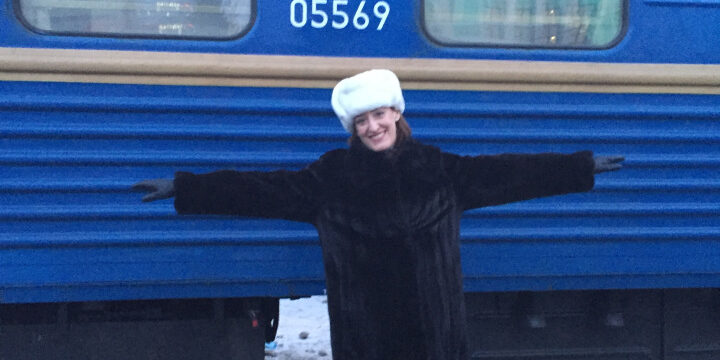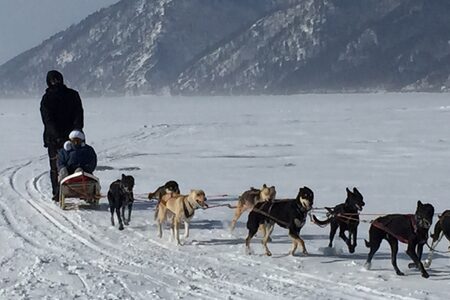
Russia’s Trans-Siberian Railway: Musings from a 10,000km Traverse
Forced into time off, I accepted a college pal’s invitation to travel the world’s longest railway, the fabled Trans-Siberian Express. In February! Siberia…in the dead of winter…when Siberia is…well…Siberian.
Russia is a great culture, with a rich history of contributions to science, math and the arts, and its natural resources seal its true geopolitical power. Russia carries visible scars of its troubled history, of course, but for one simple reason its trajectory will generally be upward in the coming decades: Russia has the cleanest balance sheet among major countries. Russia’s actions demonstrate its rejection of Keynesian economic ideas, at a time when Western economies are gradually succumbing to the ballooning debt this philosophy inspires.
Russia’s economic cycles have often differed in timing from those of the West historically, and today’s cycle is no different.
Russia is still emerging from the consequences of closing itself off to the world for more than 70 years under Soviet rule, but its upward trajectory was clear to me. Young people are optimistic about their prospects. I’m told this is true for the first time in decades. Russia’s fertility rate recently climbed back above where it was when the USSR dissolved in 1991. Its population is growing again and its suicide rate is at a 50-year low. Russia’s 20% corporate tax rate is far below that of most developed economies.
Low oil prices have dragged Russia’s economy into recession for now, but this is not as damaging to Russia as most Western observers think. Here’s why: the ruble’s value dropped by more than oil prices dropped (until recently). Translation: this meant Russia’s oil production costs went down by more than its oil revenues fell. Hence, its margins remain high while it pumps out oil at record levels. Oil-tanker trains were ubiquitous on my entire journey, moving everywhere along Siberia’s railways 24 hours a day and often sandwiching my train at station stops.
The oil price drop gave Putin political cover to cut government spending by 10% for the second consecutive year in 2016—ignoring the advice of mainstream economists who advise fiscal stimulus to counter a recession. So, sure, Russia’s GDP is dropping as its government spending drops, but that says nothing about its private sector—which is what really matters. I saw growing prosperity. Putin’s approval rating (by an independent pollster) recently was 88%, far exceeding that of any Western political leader.
I found it more difficult than it should have been to use ATM and credit cards in Russia (partly a function of Western sanctions), but ironically Russia’s relative lack of connectivity to the Western financial system since its 1998 debt default has helped prevent it from falling into the debt trap lurking for most of the world’s large economies.
Russia has the cleanest balance sheet among the world’s major countries. In other words, it has relatively little debt. Russia’s total debt-to-GDP was among the lowest of any world country at 65%, compared to 217% in China and 233% in the U.S., per McKinsey in 2015. The factor that most distinguishes Russia’s economy from virtually all others is its low debt, because debt is ballooning nearly everywhere else.
Most mainstream economists preach the twin gospels of fiscal and monetary stimulus in the face of recession—ideas rooted in collectivist economic philosophy that Russia has largely rejected. Russia has belt-tightened instead of stimulated. And its central bank has bought gold rather than sold it, again ignoring the loud calls of mainstream economists to liquidate its gold reserves to stem the ruble’s decline. In the face of Western sanctions that temporarily halted Visa and MasterCard payments in 2014 and threatened to block Russia’s access to the critical SWIFT platform for interbank payments, Russia decided to begin the long task of building its own payments platform. And Russia is striking agreements to sell its commodities in currencies other than the U.S. dollar, thus protecting itself while adding more chinks to the armor of the dollar as the currency of global trade.
Throughout its history, Russia has frequently been on a different economic cycle than the West and today appears to be yet another example. While the West was roaring in the 1920s, Russia was in a depression following its 1917 Revolution. While the West was mired in the Great Depression in the 1930s, U.S. science and engineering graduates who couldn’t find jobs at home found them in a Russia.
The practice of religion is booming in Russia, and perhaps that’s one source of optimism. As my train passed town after Siberian town, the church was invariably the newest, shiniest and most colorful building. Everyday Russians have pitched in to rebuild their local churches with fervor, celebrating their religious freedom after decades of repression under communism. I witnessed well-attended services…even on weekdays! Groups of church ladies would suddenly appear as soon as church doors opened, coming to pray and light candles even if no service were scheduled. It’s no wonder the Pope recently reached out to the Russian Orthodox Church for closer ties—it’s actually growing.
Russia’s women have played a powerful role in restoring liberty. As mothers, they’ve simply said “enough.” For example, their opposition to the wars in Afghanistan and Chechnya helped bring those wars to an end. I’m told that Russian mothers can’t understand why American mothers are so willing to send their children to war. It seems this spirit derives from widespread experience of devastating heartbreak. One example is Galina, of the Siberian village of Tarbagatay. She told us how her grandmother lost all 23 of her children to Stalin’s purges or gulags. In her village of 4,000 people, 100 families were completely wiped out. Later, during the 1991 coup attempt against Gorbachev, it was Russian mothers who came to the square in droves. Women chanted to the soldiers, “don’t shoot your mothers.” As it turns out that on 1991 day, the communists attempting to re-take power had ordered the Russian army to shoot any protesters who rose up. The actions of Russia’s mothers that day prevented the army from shooting, and the military’s neutrality at such a key turning point changed the course of history. The USSR broke up just 4 months later.
Siberia is not the vast, desolate, dreary tundra that I’d expected. In fact, its topography resembles the endless agricultural land, navigable rivers and weather extremes of America’s Midwest. Like America’s Midwest, no one really agrees where Siberia begins and ends because it has no formal boundaries.
A friend asked me to figure out why Siberia didn’t experience a “Wild West” frontier period akin to that of America’s West. I discerned two basic reasons: (1) Russia didn’t abolish serfdom until 1861, so regular Russians couldn’t pick up and move until relatively late in history, and (2) Siberia has always been viewed by Russians as a back-water, akin to how the British viewed its former penal colony of Australia. Prisoners (and enemies of the state) were sent there long before Lenin’s reign.
It was surprisingly rare to see any undeveloped land near Siberia’s railroad tracks. It was also rare to see rusting hulks of yesteryear’s industry marring the horizon. Seemingly, Gary, Indiana has more of those than all of Siberia combined. Instead, in Siberia I saw a prospering region with shiny, new skyscrapers in its largest cities.

Siberia has 20% of the world’s unfrozen fresh water supply at Lake Baikal, which is bigger than all of North America’s Great Lakes combined because of its depth. Lake Baikal’s deep-water sponges filter its water so that it is drinkable directly from the lake (though I didn’t try that!). Clean water increasingly matters amid growing scarcity of it in the world.
Siberia’s natural resource wealth and proximity to China have helped it re-engage with the world since communism fell, and its future is promising.
In many ways Russia proves the fallacies of mainstream economic thinking—especially the idea that debt/deficits don’t matter. Conventional wisdom would not predict that belt-tightening by a government and gold-buying by a central bank can result in an optimistic private sector, a stock market that recently hit an 8-year high and a president who is popular. And yet, that is exactly what’s happening in Russia.
Cleanest balance sheet, abundant natural resources, increasing optimism among youth, low taxes, low unemployment, able to pivot to Asia—these are Russia’s advantages. Bureaucracy, cronyism, rule of law and Western sanctions are among its well-known challenges. Yet, Russia is on an upswing, having endured an economic collapse during the 1990s while the West boomed. Perhaps it is again Russia’s turn to gain in relative economic power, and if past is prologue that may happen as the West retrenches.
Yes, economists, balance sheets do matter! And Russia’s is far less indebted than those of most of the world!
Siberia’s natural resource wealth and proximity to China have helped it re-engage with the world since communism fell, and its future is promising.
In many ways Russia proves the fallacies of mainstream economic thinking—especially the idea that debt/deficits don’t matter. Conventional wisdom would not predict that belt-tightening by a government and gold-buying by a central bank can result in an optimistic private sector, a stock market that recently hit an 8-year high and a president who is popular. And yet, that is exactly what’s happening in Russia.
Cleanest balance sheet, abundant natural resources, increasing optimism among youth, low taxes, low unemployment, able to pivot to Asia—these are Russia’s advantages. Bureaucracy, cronyism, rule of law and Western sanctions are among its well-known challenges. Yet, Russia is on an upswing, having endured an economic collapse during the 1990s while the West boomed. Perhaps it is again Russia’s turn to gain in relative economic power, and if past is prologue that may happen as the West retrenches.
Yes, economists, balance sheets do matter! And Russia’s is far less indebted than those of most of the world!
Founder/CEO Custodia Bank. #bitcoin since 2012. 22-yr Wall St veteran. Not advice; not views of Custodia Bank!
Disclaimer
This web site is limited to the dissemination of general information, investment-related information, publications, and links.
Please consult important additional information and qualifications HERE.
View Privacy Policy and Terms of Use
Connect with me on Social Media
Search Posts
Categories
Recent Posts
- How To Keep The Bitcoin Strategic Reserve From Morphing Into A Bailout Fund January 28, 2025
- The Engineering of Bitcoin October 1, 2023
- Here Come The Fintech Banks!! July 21, 2023
- Why Defending The Right of States to Charter Banks Without Federal Permission Is Critical April 17, 2023
- Why Can’t We Just Have Safe, Boring Banks? March 21, 2023